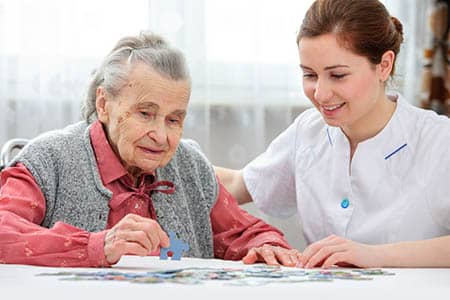The Symptoms and Stages of Alzheimer’s Disease
The Symptoms and Stages of Alzheimer's Disease
 Nearly 6.2 million Americans older than 65 are living with Alzheimer's disease in 2021, according to the Alzheimer's Association. Even with so many people living with Alzheimer's, experts are still learning to help people live the highest quality of life.
Nearly 6.2 million Americans older than 65 are living with Alzheimer's disease in 2021, according to the Alzheimer's Association. Even with so many people living with Alzheimer's, experts are still learning to help people live the highest quality of life.
June is Alzheimer's and Brain Awareness Month, making it a great time to learn about the disease. Unfortunately, there is no cure for Alzheimer's, but recognizing the signs of Alzheimer's for an early diagnosis can lead to a longer and healthier life.
What is Alzheimer's
Alzheimer's is a type of dementia that causes changes in a person's memory and behavior. It's the most common form of dementia, making up about 60 to 80 percent of dementia cases, according to the Alzheimer's Association.
Alzheimer's is not a normal part of aging, but age is one of the most significant risk factors for developing the disease. It's most commonly diagnosed in those 65 and older, but some cases, known as early-onset Alzheimer's, get diagnosed younger than 65. Additional risk factors include a family history of Alzheimer's and genetics.
The Stages of Alzheimer's
Alzheimer's is a progressive disease, meaning the symptoms get worse over time. Alzheimer's has three stages; Early, middle and late.
Early Stage- Mild Alzheimer's
During the early stages of Alzheimer's, the person can still function independently. They typically can still drive, work and engage in social situations. However, the person begins having a hard time remembering words or continues to misplace objects. They may also experience trouble concentrating, planning, or staying organized.
Close friends and family can usually notice something off about their loved one in the early stages of Alzheimer's. If you do see these signs in your loved one, encourage them to talk to their doctor. A doctor can then perform a medical review to help detect memory problems.
Middle Stage- Moderate Alzheimer's
The middle stage, or moderate Alzheimer's, tends to last the longest. During this stage, the person requires more care and has a more challenging time living independently. Memory issues become more severe such as forgetting one's address, phone number, or family members' names. They also start having a hard time recalling personal events and may confuse their current location or date.
Some people also exhibit personality or behavioral changes with moderate Alzheimer's. For example, they may become irrationally angry or refuse to take baths. They may also develop repetitive behaviors like repeating a story or asking the same questions even after you've answered it.
Late Stage- Severe Alzheimer's
When people reach the final stages of Alzheimer's, they start having a hard time interacting with others and responding to what is happening around them. Cognitive skills also deteriorate at this stage, as do motor skills. At late-stage Alzheimer's, the person is likely unable to care for themselves and may need assistance with daily tasks such as showering and eating.
People with late-stage or severe Alzheimer's also become more susceptible to infections. Pneumonia is one of the most common causes of death among Alzheimer's patients. To help prevent pneumonia, the Alzheimer's Association recommends good oral hygiene to reduce the risk of pneumonia bacteria growing in the mouth. This includes thoroughly brushing and cleaning dentures as well.
If you or a loved one live with Alzheimer's, the Right at Home Boston and North team is here to help. Our caregivers assist seniors with daily tasks so they can continue to live a safe and comfortable life in their homes. We create a custom care plan tailored to your loved one's needs. To learn more about our services, you can contact us online or give us a call at (617) 272-7702.



